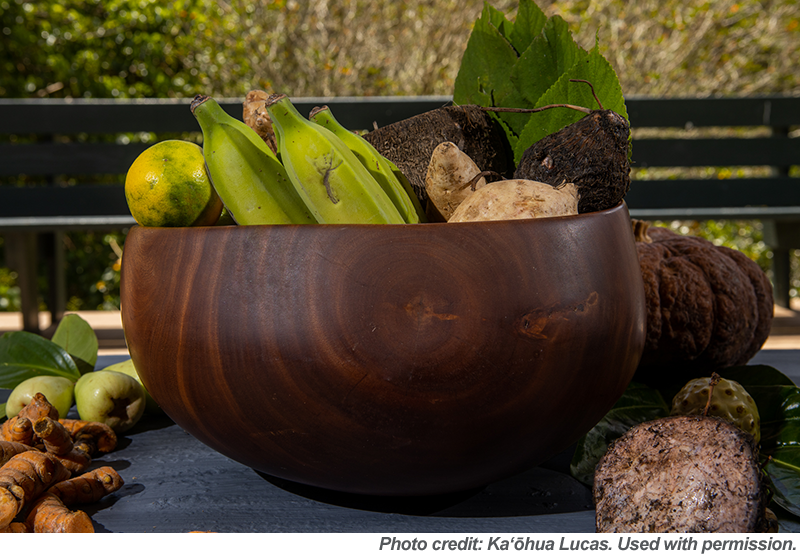
Applications are no longer being accepted for the Full Calabash Fund.
In Hawai‘i, when a ‘umeke or calabash was full, it was a sign of strong relationships, knowledge, and resource abundance held within our communities. Following this tradition, The Kohala Center and a group of Hawai‘i food systems practitioners have established a Full Calabash Fund. The Full Calabash Fund reminds us of the honor that comes from the generous exchanges of gifts, including time, energy, and food. Although the coronavirus pandemic is an unprecedented event in our lifetimes, the ways we feed our future are still deeply rooted as we craft elegant solutions that strengthen food security and improve community access to healthy and nutritious food.
»View/download Full Calabash Fund description
»View/download Request for Proposals and Application Form

With initial funding from The Harry and Jeanette Weinberg Foundation, Frost Family Foundation, and The Johnson Ohana Foundation, the fund will support Hawaiʻi’s community-based organizations that are purchasing food from local farmers, ranchers, and food producers AND providing food to community members in need. The fund will support those who are struggling to access affordable, nutritious food and those who are challenged in bringing food to market due to food service industry closures. Ultimately, Hawaiʻi’s community food system will benefit from the development of more connected and resilient local food networks, an increased emphasis on the importance of local farmers, ranchers, and fishers, and access to healthy, locally grown, raised, and harvested food. Working together, we will keep Hawaiʻi farmers farming, ranchers ranching, and fishers fishing, support Hawaiʻi’s culinary workforce and businesses, and feed our communities.
A minimum of 50% of all grant funds MUST be used to purchase products that are locally grown, raised, harvested, or value-added. Grant recipients will submit semiannual reports that detail the dollar amounts and types of local food purchased, and number of community members and families fed. As fundraising continues, grants may be extended to agricultural producers to support meeting the statewide need for local food, particularly those growing food for community emergency feeding and distribution programs. As the COVID-19 pandemic unfolds and community needs evolve, The Kohala Center will conduct assessments for learning to ensure the fund’s responsiveness, while remaining committed to the underlying goal of developing a resilient local food system.
Organizations and foundations can donate to the Full Calabash Fund by contacting Nicole Milne, The Kohala Center’s vice president of food and agriculture initiatives, at (808) 987-9210 or nmilne@kohalacenter.org.
The Full Calabash Fund is being hosted and managed by The Kohala Center, an independent 501(c)(3) focused on research, education, and ‘āina stewardship for healthier ecosystems. By turning ancestral knowledge and research into action, we cultivate conditions that reconnect us with our food, water, place, and people. The Center currently operates statewide loan and grant programs to support small-scale agricultural producers that contribute to building resilience in communities. Staff will support grantees in identifying additional resources beyond Full Calabash grants that further their capacity to do this important and urgent work in their communities. As a local fund administered by food system practitioners with deep knowledge and expertise, this resource will facilitate informed and nimble responses to nourish our community now and into the future.
Applicant Organizations
Q: Should the applicant be distributing food to the end user?
A: Yes, the applicant organization should be the entity directly delivering local food and/or meals to food insecure families and island residents.
Q: Can an organization submit multiple applications?
A: No, only one application is allowed per organization, however you may apply for funding for multiple feeding initiatives in a single application.
Q: Can an organization submit a proposal AND be a contracted entity on a proposal being submitted by another organization?
A: Yes.
Project Partners
Q: Should project collaborations be solidified prior to application?
A: Applicants who have firm and stated commitments from partner organizations, or have existing partnerships around food sourcing, preparation, and/or delivery, may score higher than applicants establishing new food distribution programs or applicants with uncommitted partner organizations.
Local Sourcing
Q: What does “local” mean? Can a feeding program on Hawaiʻi Island purchase product from Maui?
A: Yes! Local means anywhere in the state, as farmers across Hawai‘i have experienced shifts in market demand due to the pandemic and could benefit from these new market opportunities.
Q: We currently purchase food from local distributors to use in our community meal programs. As local companies, do purchases from them qualify for the grant requirements?
A: We will require proof that the food purchased from local distributors is sourced from local farmers (agricultural producers based in Hawaiʻi). For example, if you received a $50,000 grant, we would require proof that $25,000 was being paid to distributors for local food purchases, however you could spend additional funds beyond the $25,000 on non-local food purchased from the distributors.
Q: What does the following question mean: Please include all the names of the ‘āina your food will come from.
A: Great question! We encourage applicants to describe the places where the food sourced for the project will come from. We all know that food doesn’t just come from the grocery store or a distributor. While you may have a distributor as your contracted partner, find out more about where they source their food from across Hawaiʻi. You could share, for example, that your food will come via distributor X, which sources lettuce from Hawaiʻi Island’s Lālāmilo Ag Lots in Waimea, papaya from growers in Kaʻū District of Hawaiʻi Island, and ʻulu from Hawaiʻi Island’s Hawaiʻi ʻUlu Cooperative. If you know the names of the moku, ahupua‘a, or ʻili where your food comes from, please include those names too!
Budget
Q: Are infrastructure costs allowed?
A: Yes. Please justify the need for infrastructure to support the longevity of your program in the budget justification section.
Q: Can equipment be purchased with grant funds?
A: Yes. Please justify the need for equipment in the budget justification section, specifically how that equipment will contribute to community feeding initiatives into the future. The intent of the Full Calabash Fund is to provide funding to organizations directly engaged in feeding Hawai‘i’s most vulnerable residents, consequently budget expenses should support existing feeding initiatives and enable feeding organizations to continue to do this work in the future.
Project Period
Q: Can an applicant’s project end prior to December 31, 2021?
A: Yes.
